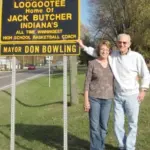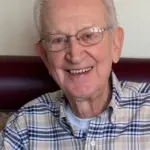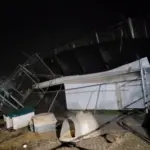(photo from WIBC)
(NETWORK IN) What should America’s role be on the international stage?
That was the primary question asked to two of your former lawmakers Wednesday afternoon at the 3rd annual “America’s Role in the World Conference” at Indiana University in Bloomington.
Former Indiana Senator Richard Lugar and former Democrat Congressman Lee Hamilton answered questions on a variety of topics, all having to do with U.S. Foreign Policy.
“Our role in the world is to be an international leader with cooperation with as many countries as possible,” Sen. Lugar said.
“I want to see the U.S role in the world to be characterized by being a ‘benign power’,” Rep. Hamilton added.
The two former lawmakers shed some light on what goes into the process of dealing in foreign policy when it comes to the United States government. Both agreed that bipartisan cooperation between the President and Congress is a necessity.
“Executive power is the center of foreign policy in decision making. Having said that the Congress plays a key role,” Hamilton said. “We have to understand that the Congress plays a role in the formulation of foreign policy, not the implementation.”
However, according to Rep. Hamilton, former Presidents were not been very willing to work with Congress on formulating strategies for foreign policy.
“One of the problems on the executive branch side is that they really don’t want to consult with the Congress, basically,” said Hamilton. “The Congress is an ‘obstacle to deal with’ rather than a partner in the process.”
Sen. Lugar alludes to the fact that there is not a lot of strategy these days when it comes to America’s dealings abroad.
“We don’t have a strategy in Syria or Afghanistan, or these various other places,” Lugar said. “The President is not formulating a strategy, but somebody needs to. There need to be people that are forthcoming here.”
Nuclear weapons was a big part of their conversation on foreign policy, more specifically how they should be used if the day ever came for the use of a nuclear weapon on another country by the United States.
Senator Lugar recalled his dealings on the Senate Foreign Relations Committee and their strategy to tackle the problem of what to do with the left over nuclear weapons from the dissolving Soviet Union in 1991. He says sometimes the situation calls for lawmakers to literally get their hands dirty.
“We got the Threat Reduction Act passed and it provided $100 million for the United States (Senators) to come and intervene literally on the ground,” Lugar said. “Then we on the foreign policy committee to a plane ride over to Russia and we saw how dangerous it was for us, and this led to a degree of safety.”
Lugar said then President George H.W Bush was not thrilled at first about the Senate essentially circumventing both the President and then Secretary of State James Baker in dealing with the Russia’s nuclear weapons, but that it was a necessary means to end when it came to dealing with the issue.
Both Lugar and Hamilton agreed through that the President should not be allow to unilaterally make the decision to fire a nuclear weapon on an adversary of the United States.
“The founding fathers are very clear on the point,” Hamilton said. “The President if the Commander-in-Chief, Congress shall declare war. When you go to war it is a shared decision. I do not want the President, by himself, ordering a nuclear strike.”
For both men, it all came back to the notion have having a strategy when it comes to dealing with hostile countries with nuclear weapons, like North Korea. Hamilton says a strong military is a necessity if foreign policy, but that the first priority is settling disputes through diplomacy.













